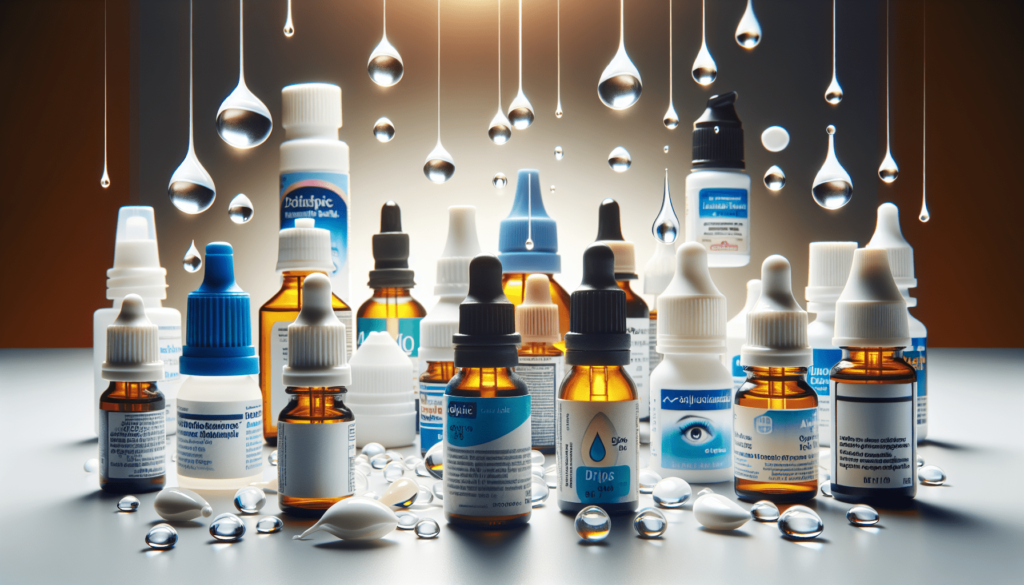Welcome to an informative article about the most effective treatments for dry eye syndrome. If you’ve been experiencing symptoms such as irritation, redness, or blurred vision, you’re not alone. Dry eye syndrome is a common condition that can be uncomfortable and disruptive to daily life. Fortunately, there are several effective treatments available to help alleviate symptoms and improve the overall health of your eyes. From artificial tears to lifestyle changes, we’ll explore the best options to keep your eyes feeling refreshed and healthy.
What Are The Most Effective Treatments For Dry Eye Syndrome?
Dry eye syndrome is a common condition that occurs when your eyes do not produce enough tears or when your tears evaporate too quickly. If you’re experiencing symptoms like dryness, irritation, and blurred vision, you may be wondering what the most effective treatments are for dry eye syndrome. In this article, we’ll explore various treatment options that can help alleviate your symptoms and improve your eye health.
Understanding Dry Eye Syndrome
Before we delve into the treatments for dry eye syndrome, let’s take a closer look at what causes this condition. Dry eye syndrome can occur due to a variety of factors, including:
- Aging
- Hormonal changes
- Environmental factors
- Medications
- Medical conditions
When your eyes fail to produce enough tears or when the quality of your tears is compromised, you may experience dryness, burning, redness, and sensitivity to light. It’s essential to consult with an eye care professional to determine the underlying cause of your dry eye symptoms before starting any treatment.
Artificial Tears
One of the most common treatments for dry eye syndrome is the use of artificial tears. These lubricating eye drops help to moisturize your eyes and alleviate dryness, irritation, and discomfort. Artificial tears are available over the counter and come in various formulations, including preservative-free, gel, and ointment.
When choosing artificial tears, it’s essential to consider your specific needs and symptoms. Some artificial tears are designed to provide long-lasting relief, while others may be more suitable for daytime or nighttime use. Your eye care professional can recommend the best artificial tears for your unique situation.
Prescription Eye Drops
In some cases, over-the-counter artificial tears may not provide adequate relief for severe dry eye symptoms. Your eye care professional may prescribe prescription eye drops to help manage your condition. Prescription eye drops can help reduce inflammation, stimulate tear production, and improve tear film stability.
Before using prescription eye drops, it’s crucial to follow your eye care professional’s instructions carefully. Some prescription eye drops may cause temporary stinging or blurry vision, so it’s essential to use them as directed to maximize their effectiveness.
Punctal Plugs
Punctal plugs are small, biocompatible devices that are inserted into the tear ducts to block the drainage of tears from your eyes. By blocking the tear ducts, punctal plugs help to preserve your natural tears and keep your eyes moist and comfortable. Punctal plugs are a minimally invasive procedure that can provide long-lasting relief for dry eye symptoms.
If you’re considering punctal plugs as a treatment for dry eye syndrome, it’s essential to consult with an eye care professional to determine if this option is suitable for you. Your eye care professional can assess your tear production and tear film quality to determine the most appropriate treatment plan for your condition.
Meibomian Gland Dysfunction (MGD) Treatments
Meibomian gland dysfunction (MGD) is a common cause of dry eye syndrome that occurs when the glands in your eyelids become blocked or inflamed. MGD can lead to a decrease in the quality of your tears, resulting in symptoms like dryness, redness, and irritation. To manage MGD and improve your tear film quality, your eye care professional may recommend the following treatments:
- warm compresses
- lid scrubs
- meibomian gland expression
- eyelid hygiene
By incorporating these treatments into your daily routine, you can help to alleviate MGD-related dry eye symptoms and improve the overall health of your eyes.
Nutritional Supplements
Certain nutritional supplements, such as omega-3 fatty acids, can help support tear production and improve tear film quality in individuals with dry eye syndrome. Omega-3 fatty acids are essential nutrients that play a crucial role in maintaining eye health and reducing inflammation. By incorporating omega-3 supplements into your diet, you may experience a reduction in dry eye symptoms and an improvement in tear film stability.
Before taking any nutritional supplements, it’s essential to consult with your healthcare provider to ensure they are safe and appropriate for your individual needs. Your healthcare provider can recommend the right dosage and formulation of omega-3 supplements to help manage your dry eye symptoms effectively.
Lifestyle Changes
In addition to medical treatments, making lifestyle changes can also help manage dry eye syndrome and improve your eye health. Some lifestyle changes that may benefit individuals with dry eye syndrome include:
- staying hydrated
- taking regular breaks from screen time
- using a humidifier in dry environments
- avoiding smoke and air pollutants
By incorporating these lifestyle changes into your daily routine, you can help support the overall health of your eyes and reduce dry eye symptoms.
Consult with an Eye Care Professional
If you’re experiencing persistent dry eye symptoms despite trying various treatments, it’s essential to consult with an eye care professional. Your eye care professional can perform a comprehensive eye exam to determine the underlying cause of your dry eye syndrome and recommend an appropriate treatment plan.
By working closely with your eye care professional and following their recommendations, you can effectively manage your dry eye symptoms and improve the health of your eyes. Remember, early detection and treatment are key to preventing complications and maintaining optimal eye health.
In conclusion, dry eye syndrome is a common condition that can cause discomfort and affect your quality of life. By exploring various treatment options and working with an eye care professional, you can find relief from dry eye symptoms and improve the overall health of your eyes. Remember to be proactive about your eye health and to seek help if you’re experiencing persistent dry eye symptoms. Your eyes are precious, so take care of them diligently.

